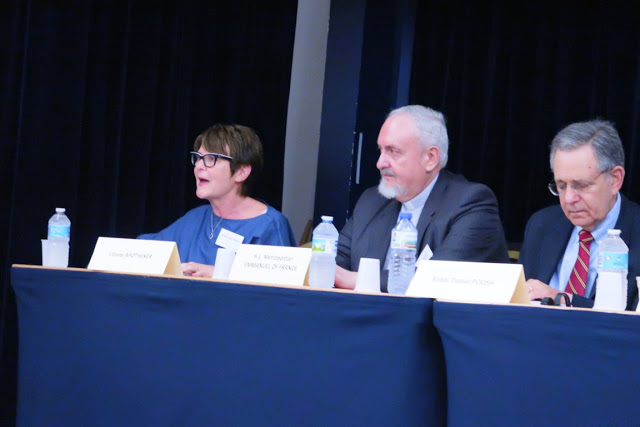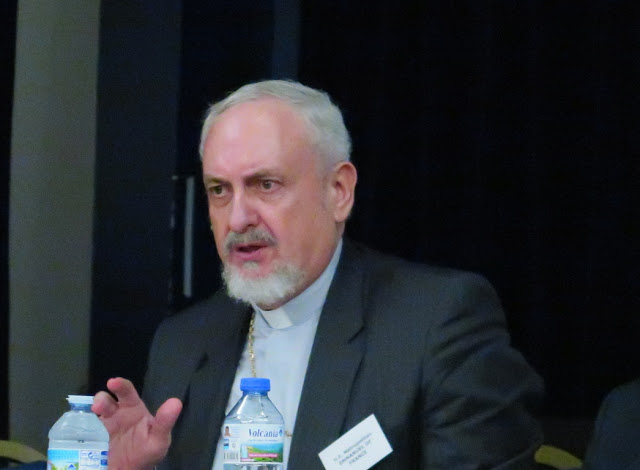
Ι. Μητρόπολη Γαλλίας
Συνάντηση μεταξύ του Παγκοσμίου Συμβουλίου Εκκλησιών (WCC) και της Διεθνούς Εβραϊκής Επιτροπής για τον Διαθρησκειακό Διάλογο (IJICIC) πραγματοποιήθηκε σήμερα το πρωί στο Παρίσι.
Ένας από τους κεντρικούς ομιλητές ήταν ο Σεβασμιώτατος Μητροπολίτης Γαλλίας κ. Εμμανουήλ, ο οποίος υπεραμύνθηκε των θέσεων της Ορθοδόξου Εκκλησίας, ενώ σε δημόσια προσβλητική επίθεση που δέχθηκε κατά του ελληνισμού, απάντησε με σκληρότητα ότι ουδέποτε η Ορθόδοξη Εκκλησία και το γένος των Ελλήνων εκφράστηκαν υποτιμητικά για τους Εβραίους και ότι στο σύγχρονο ελληνικό κράτος έχουν εξαλειφθεί τα φαινόμενα αντισημιτισμού που παρατηρούνται σε άλλες κοινωνίες.
Αναφέρθηκε μάλιστα στα ιστορικά γεγονότα της ηρωικής διάσωσης των ελλήνων πολιτών Εβραίων κατά τον Β΄ Παγκόσμιο Πόλεμο στη Ζάκυνθο από τον μακαριστό Μητροπολίτη κυρό Χρυσόστομο, στη Θεσσαλονίκη από τον μακαριστό Μητροπολίτη κυρό Γεννάδιο και στην αξιομνημόνευτη επίσημη επιστολή διαμαρτυρίας που υπεγράφη στην Αθήνα στις 23 Μαρτίου 1943 από τον μακαριστό Αρχιεπίσκοπο κυρό Δαμασκηνό και 27 ηγετικά μέλη πολιτιστικών, ακαδημαϊκών και επαγγελματικών οργανώσεων.
Διαβάστε την εισήγηση του Σεβασμιωτάτου στην αγγλική γλώσσα:

“The normalization of hatred: challenges for Jews and Christians today”
His Eminence, Metropolitan Emmanuel of France
IJCIC-WCC meeting
Paris, June 2019
Distinguished guests,
Ladies and Gentlemen,
Dear friends,
On behalf of the Ecumenical Patriarchate, I would like to congratulate you on the occasion of this joint meeting between the IJCIC and WCC on the crucial topic of hatred.
Last May, I accompanied H.A.H. Ecumenical Patriarch Bartholomew on his visit to Auschwitz-Birkenau, in Poland. In the history of humanity, very few places have inspired so much terror, abomination and horror. Auschwitz-Birkenau encapsulates what humankind, moved by pure hatred, can do to dehumanize and desacralize the image of God placed in each and every person.
I was profoundly moved by this opportunity to stand at this place where so many died, victims of hatred and a bloody thirst for injustice. The world continues to mourn this disaster, this unspeakable tragedy. While walking on the ground of what is today a memorial, the words of Prophet Jeremiah sprang to mind: “How long will the land mourn and the grass of the field wither, because of the vices of those who dwell in it?” (Jr 12:4)
The Orthodox Church has many historic ties to Judaism and to the Jewish people. During the Second World War, the people of Greece and the Orthodox Church fought for their Jewish brothers and sisters and saved many of them.
On July 11, 1942, for example, the German Nazis surrounded the Jews in the city of Thessalonica in northern Greece, in order to send them to the concentration camps. The community paid 2.5 billion drachmas for their freedom, but all they could do was to delay the transfer until the following March. 96% of the members of the Jewish community in Thessalonica, 46,091 people, were sent to Auschwitz. Only 1,950 of them returned to find most of their sixty synagogues destroyed, their cemetery was sacked and their schools dilapidated. Some of the survivors migrated to Israel and the United States. The Jewish community of Thessalonica survived and currently has about 1,000 members and maintains four synagogues. We remember with pride the bold and courageous behavior of the late Metropolitan Gennadios of Thessalonica who repeatedly took initiatives to protect the city’s Jewish community.
As H.A.H Ecumenical Patriarch Bartholomew also recalled during his last visit to Poland, many stories have been recorded of pure sacrificial love during this horrible time. Among them, he reminded us of Saint Maria of Paris, together with her friends and her son, Yuri. During the Second World War, she was arrested by the Gestapo in France for helping Jews to escape persecution and sent to Ravensbrück concentration camp, where she was selected for the gas chambers on Holy Saturday, 1945. She is not only a saint of the Orthodox Church but also a Righteous Among the Nations. Her destiny reminds us of the self-sacrificial love that transcends hope itself to become divine.
Orthodox Christians stand with sorrow in front of human pain and war. Our faith teaches us that we must not be unfair and irresponsible towards our brethren. As the official document “The Orthodox Church Mission in the Modern World” of the Holy and Great Council of the Orthodox Church in Crete in 2016 states: ” secularism; violence; moral laxity; detrimental phenomena such as the use of addictive substances and other addictions especially in the lives of certain youth; racism; the arms race and wars, as well as the resulting social catastrophes; the oppression of certain social groups, religious communities, and entire peoples; social inequality; the restriction of human rights in the field of freedom of conscience—in particular religious freedom; the misinformation and manipulation of public opinion; economic misery; the disproportionate redistribution of vital resources or complete lack thereof; the hunger of millions of people; forced migration of populations and human trafficking; the refugee crisis; the destruction of the environment; and the unrestrained use of genetic biotechnology and biomedicine at the beginning, duration, and end of human life. These all create infinite anxiety for humanity today”.
Unfortunately, even today, extremist groups continue to cultivate anti-Semitism. In recent years, the Jewish community in France has been deeply wounded by several vile attacks and murders, clearly showing that anti-Semitism is still real and very much alive. It is unacceptable for us, as Christian leaders, to look the other way while this vile trend spreads across Europe.
In its statement, the European Council recognizes that Jewish communities in various EU countries feel particularly vulnerable to terrorist attacks following the increase in violent incidents in recent years. It notes that anti-Semitic hatred remains widespread, as confirmed in the 2018 Anti-Semitism Report of the Fundamental Rights Agency.
The declaration calls on the Member States to adopt and implement a holistic strategy to prevent and combat all forms of anti-Semitism in their strategies for the prevention of racism, xenophobia, radicalization and violent extremism. Member States are also invited to step up their efforts to guarantee the safety of Jewish communities and institutions, and Jewish citizens.
Ladies and Gentlemen,
Dear friends,
Let us reflect on the words of Martin Luther King Jr.: “Darkness can not drive away the darkness. Only the light can do that. Hate can not extinguish hate. Only love can do that.” To fight Anti-Semitism, hatred, and discrimination of all kinds, we all need to be involved. The role of education and family is very important indeed, but religious communities also have a key role to play in eradicating racism, xenophobia and anti-Semitism.
The ongoing outburst of religious fundamentalism and terrible acts of violence perpetrated in the name of religion lend credence to modern critiques of religious faith and support the identification of religion with its negative aspects. The truth is that violence is the negation of our fundamental religious beliefs and doctrine. True faith does not release humans from responsibility for the world or the obligation to respect human dignity and struggle for justice and peace. On the contrary, it strengthens or commitment to action and enlarges our witness for freedom and human core values.
As Herodotus, the great Greek historian and father of historiography wrote: “Οὐδείς γάρ οὕτω ἀνόητος ἐστί ὅστις πόλεμον πρό εἰρήνης αἱρέεται• ἐν μέν γάρ τή οἱ παῖδες τούς πατέρας θάπτουσι, ἐν δέ τῳ οἱ πατέρες τούς παῖδας”, which means: “No one is so foolish as to prefer war to peace. In peace, sons bury their fathers. In war, fathers bury their sons.”
Thank you for your attention!
